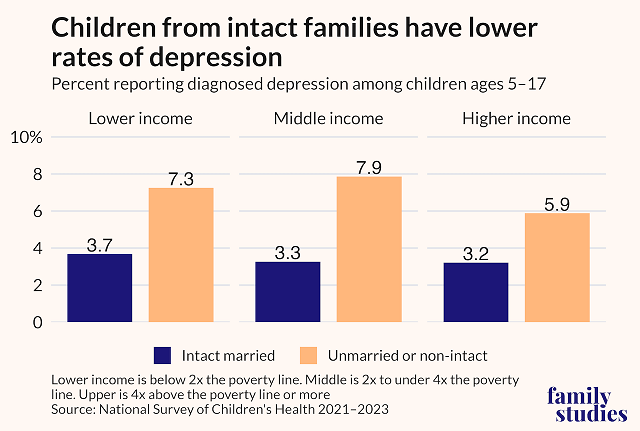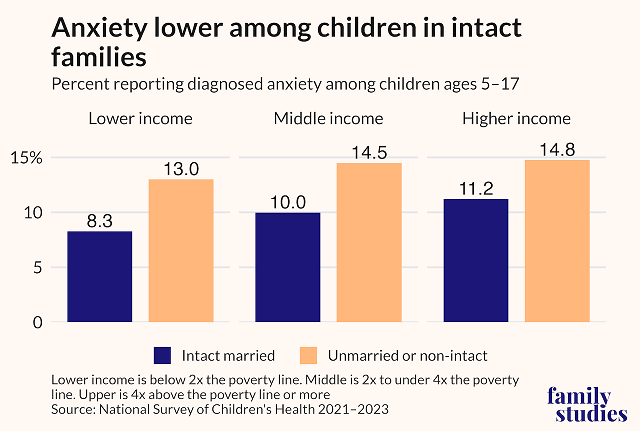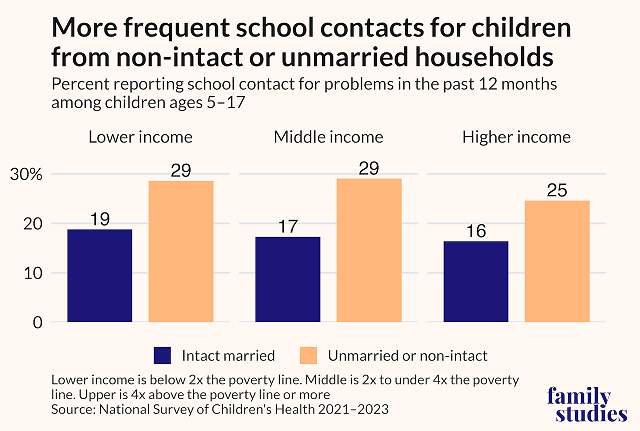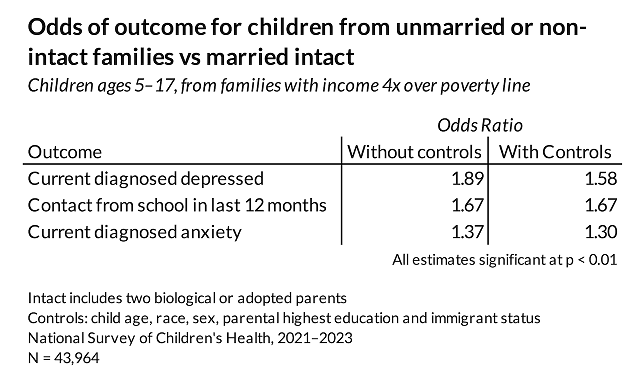Highlights
- Children from wealthier families are more likely to graduate college and stay wealthy when raised in an intact family. Post This
- For some on the right, family structure is relatively unimportant, especially at the upper echelons of society. But this view is not consistent with the evidence. Post This
- Children from married intact families enjoy better mental health, graduate from college at higher rates, and earn more money. This pattern applies even to kids with every apparent material advantage. Post This
The family structure debate has finally arrived on the right, and Elon Musk’s unorthodox (to put it mildly) pronatalism is the occasion.
Musk’s approach to family life indicates that some on the right do not think family structure matters for kids. Over the decades, primarily left-leaning commentators have discounted the importance of marriage and family structure. But now, on the other end of the political spectrum, there are those on the right suggesting that kids will do fine, so long as their parents have money or the right genes. From this corner of the right, family structure is relatively unimportant, especially at the upper echelons of society.
But this view is not consistent with the evidence. Children from wealthier families are more likely to graduate college and stay wealthy when raised in an intact family. As documented in Brad Wilcox’s book, Get Married, among children raised in upper-income families, those who lived with both biological parents are twice as likely to graduate from college as their affluent peers who did not.1 This comes from an analysis of the National Longitudinal Study of Youth 1997 (NLSY97), a survey that followed the lives of nearly 9,000 teenagers into their adulthood. The same data also suggests that rich kids whose parents stick together have 73% higher odds of remaining rich as adults compared to their peers whose parents do not.2
These findings—that advantaged kids from intact families do better—hold across nationally representative surveys. Using the 2021 to 2023 National Survey of Children’s Health, we find that kids from intact married families are less prone to depression, anxiety, and behavior problems, across every income bracket.3 Whereas about 6% of children from higher-income families living in unmarried or non-intact homes are diagnosed with depression, just over 3% of their peers from intact married homes are likewise diagnosed. This pattern is consistent, to varying degrees, across income brackets.

The story about anxiety is similar. Children from intact families have lower rates of diagnosed anxiety than their peers across income brackets. For those from wealthier households, 11.2% of children in intact families have diagnosed anxiety, whereas 14.8% report diagnosed anxiety among those hailing from unmarried or non-intact households.

The differences between intact and non-intact households are also reflected in child learning or behavior problems at school. A quarter of children from wealthier, non-intact or unmarried households have had their school contact home for some problem in a given year. This compares to 16% of children in wealthier, intact married households.

Of course, there are other factors that contribute to outcomes like depression, anxiety, and school issues beyond income and family structure. But we find that these differences hold up even with controls. Specifically, when we add age, race, sex, parental education and immigrant status controls, we find that among children from wealthier households, those with unmarried or non-intact families are 58% more likely to be depressed, 30% more likely to be diagnosed with anxiety, and 67% more likely to have had recent school contact.

This leaves those on the right who take the heterodox view that family structure does not matter for advantaged kids in a tough position. The data is clear: children from married intact families enjoy better mental health, graduate from college at higher rates, and earn more money. This pattern applies even to kids with every apparent material advantage.
The family structure debate may have just arrived on the right. But the Musk family drama reveals nothing beyond what we already know: even rich kids benefit from a stable, intact home.
Grant Bailey is a Research Associate of the Institute for Family Studies. Wendy Wang is Director of Research at the Institute for Family Studies.
1. Brad Wilcox, Get Married, pg. 72
2. Analysis of the NLSY97 by Lyman Stone
3. Intact families include two biological or adopted parents.










